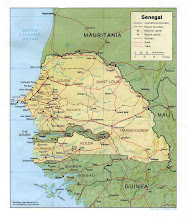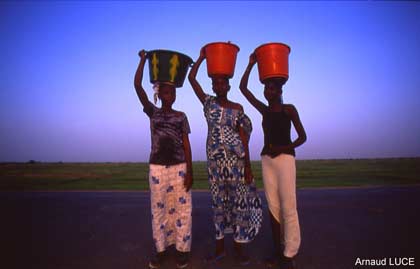Iran's presence in Senegal is growing, following on the SenIran plant. This in Tehran Times:
"SHIRAZ – The governor general of Iran’s Fars Province, Mohammadreza Rezazadeh and Senegalese Commerce Minister Mamadou Diop signed a memorandum of understanding on late Monday in which Iran agreed to build a trade center in Dakar.
"According to Mehr News Agency, Rezazadeh called Senegal an entrance gate to Africa’s markets.
"He added that during his last visit to Senegal, Shiraz’s private sector successfully formed a trade consortium in the African country that would help promote trade between Senegal and the Iranian province.
"Diop welcomed the promotion of bilateral trade ties, saying that Senegal lacks modern industries and is in need of the latest technology."
Wednesday, January 28, 2009
Wednesday, January 14, 2009
Tough love: IMF spanks Dakar budgeting but promises "exogenous shocks" relief
In a report issued yesterday, the International Monetary Fund revealed much about Senegal's fiscal problems over the last year. But, after hard work over the last six months or so, the IMF concludes that Senegal has tackled "extrabudgetary expendi-tures" and nonpayment of its bills, so much so that the IMF approved relief from the IMF's "Exogenous Shocks Fund." Indeed "exogenous shocks"-- the high oil prices and food shortages-- were evidently a big reason for the government's "off-budget" spending, to the detriment of contractors, such as those in Touba that we have posted about before.
The actual report is titled:
"Senegal: Second Review Under the Policy Support Instrument, Request for a Twelve-Month Arrangement Under the Exogenous Shocks Facility, and Request for Waivers and Modification of Assessment Criteria—Staff Report; Staff Statement; Press Release on the Executive Board Discussion; and Statement by the Executive Director for Senegal" and dated January 2009.
Nestled in the economists' jargon are many revelations of what has been happening with Senegal's budget. We'll try to post further, but meanwhile here is one of the conditions the IMF is putting on "exogenous shock" relief, pertaining to an audit of the government's actual indebtedness to its private contractors:
“No payments will be made to the private sector for any extrabudgetary expenditure before the audit has established the nature of claims and specified the goods and services that were provided and their unit cost. To prevent a recurrence of such spending, the government will impose sanctions on employees found to be at fault and apply a discount factor to the claims of private firms that agreed to provide goods or services on unlawful terms. The government will pay claims recognized on the basis of the audit only after authorization by a budget law providing for simultaneous reductions of appropriations for other expenditure items.” (IMF report, page 46, item 26.)
In other words: contractors who do work on the promise of money that hasn't been legally authorized will take their chances.
The actual report is titled:
"Senegal: Second Review Under the Policy Support Instrument, Request for a Twelve-Month Arrangement Under the Exogenous Shocks Facility, and Request for Waivers and Modification of Assessment Criteria—Staff Report; Staff Statement; Press Release on the Executive Board Discussion; and Statement by the Executive Director for Senegal" and dated January 2009.
Nestled in the economists' jargon are many revelations of what has been happening with Senegal's budget. We'll try to post further, but meanwhile here is one of the conditions the IMF is putting on "exogenous shock" relief, pertaining to an audit of the government's actual indebtedness to its private contractors:
“No payments will be made to the private sector for any extrabudgetary expenditure before the audit has established the nature of claims and specified the goods and services that were provided and their unit cost. To prevent a recurrence of such spending, the government will impose sanctions on employees found to be at fault and apply a discount factor to the claims of private firms that agreed to provide goods or services on unlawful terms. The government will pay claims recognized on the basis of the audit only after authorization by a budget law providing for simultaneous reductions of appropriations for other expenditure items.” (IMF report, page 46, item 26.)
In other words: contractors who do work on the promise of money that hasn't been legally authorized will take their chances.
Thursday, January 1, 2009
President Wade: "Happy economic new year!!"
Senegal's President Abdoulaye Wade used his New Year's Eve message to the county to highlight bold economic initiatives out of the daunting climate of the last year. Noting the "off budget" expenditures that the World Bank found fault with, President Wade still claimed that Senegal was the World Bank's highest rated economy.
The president pointed to the launching of Air Teranga, a Senegalese airline, new universities at St. Louis and Kedougou, and the regional port facilities with free market zones and surface connections to Mali and elsewhere in the region. Other infrastructure lurches fitfully ahead at the turn of the year. "If I were to list these projects, it would take much time, I gave instructions to ministers to publish a table with a list of infrastructure to be carried out in 2009" he said. Of course, the World Bank in its requirements to put Senegal back on its approved list required that the country list all such major projects--necessary to get a grip on the off-budget spending and commitments...
It was a detailed speech with a certain Senegalese optimism throughout. The president didn't shy from most of the nation's problems: high gas prices, energy outages, food insecurity. But he was able to point to activities to deal with the problems, especially in the area of agriculture. Fortuitous good harvests help, too. But so do tractors from India and increasing sophistication in the country's animal husbandry... Recent riots in the hinterlands were largely ignored however...
The president pointed to the launching of Air Teranga, a Senegalese airline, new universities at St. Louis and Kedougou, and the regional port facilities with free market zones and surface connections to Mali and elsewhere in the region. Other infrastructure lurches fitfully ahead at the turn of the year. "If I were to list these projects, it would take much time, I gave instructions to ministers to publish a table with a list of infrastructure to be carried out in 2009" he said. Of course, the World Bank in its requirements to put Senegal back on its approved list required that the country list all such major projects--necessary to get a grip on the off-budget spending and commitments...
It was a detailed speech with a certain Senegalese optimism throughout. The president didn't shy from most of the nation's problems: high gas prices, energy outages, food insecurity. But he was able to point to activities to deal with the problems, especially in the area of agriculture. Fortuitous good harvests help, too. But so do tractors from India and increasing sophistication in the country's animal husbandry... Recent riots in the hinterlands were largely ignored however...
Labels:
agriculture,
airline,
food,
New Year,
Senegal
Subscribe to:
Posts (Atom)


